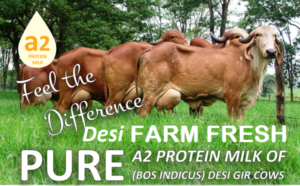
Milk, considered as complete food for centuries, was consumed extensively by our ancestors, scholars and saints to maintain a healthy and wholesome life. That is because they had access to the pure and truly nourishing A2 milk available from the free-grazing, hygienically bred and sacred cows.
Some of the native breeds from India producing A2 milk include :
- Sahiwal from Punjab,
- Gir from Gujarat, and
- Tharparkar from Rajasthan
- Vechur from Kerala
Some of the above breeds are getting extinct due to large scale cross-breeding and export to European and American countries. Consequently, Gir cow, is now being imported from Brazil and the Brahmi Bull, which is another pure breed, is more popular in Australia.
Benefits of A2 milk
- A2 casein is found to be protective against Allergies (such as gut, skin rashes, hay fever, cough)
- A2 cows milk contains Vitamin D. This could be due to the fact that rays of the sun enter the body of the cow through the hump also imparting a yellowish tinge to the milk.
- Some studies indicate that A2 milk contains the beneficial omega 3 fatty acids . This could be attributed to the diet of the cows consisting primarily fresh green grass which contains the omega 3 fatty acids.
Due to the above factors, desi cow’s milk and ghee and the by products such as urine and dung of the desi cow have medicinal properties and less adverse effects. In India, desi A2 cow milk is marketed under the brand name of Pathmeda in some parts.
Desi Indian cow is a very unique species; can be recognized with the hump on the back and long horns. We need to conserve and protect desi cows to get the best nutrition from milk.
References:
https://www.ncbi.nlm.nih.gov/pmc/articles/PMC3475924/
